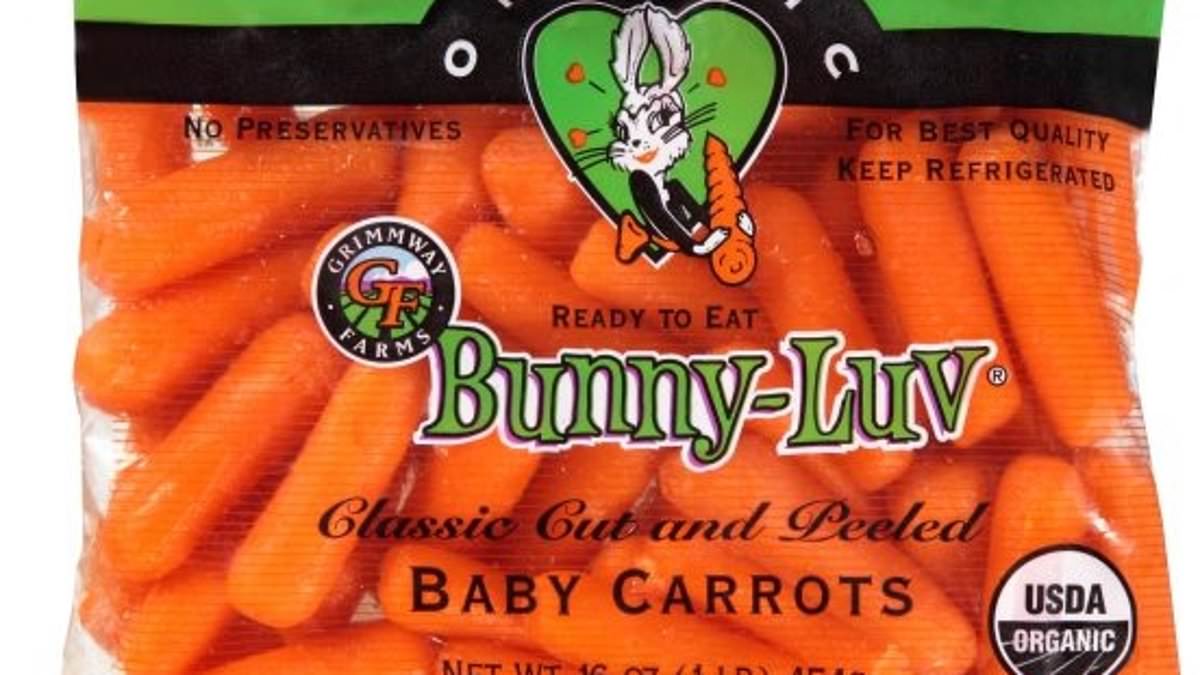Nearly seven dozen carrot products have been recalled over fears of E.coli contamination, including those sold at Trader Joe’s and Whole Foods.
On Saturday, Grimmway Farms — a major produce supplier — announced the recall of its organic baby and whole carrots sold at the nation’s biggest stores.
Among other stores affected were Wegmans, Target and Walmart, with the carrots sold on their shelves between August 14 and November 12.
The carrots are no longer in stores, but officials fear the contaminated vegetables could still be lurking in people’s fridges and freezers — and are urging people to throw them away immediately.
An investigation linked the carrots to an outbreak of E.coli that has so far sickened 39 people, hospitalized 15 and led to one death.
The illnesses have been recorded in 18 states, with Washington having the most — eight cases — followed by Minnesota and New York which both had five.
Cases are expected to rise in the coming days, however, because it can take up to 10 days for symptoms of an E. coli infection to emerge.
This is just the latest major E.coli outbreak to hit the US, after 150,000 bottles of drinking water were recalled last week and McDonald’s had to recall Quarter Pounders in October due to the bacteria.

A graphic shows several of the more than 70 organic whole and baby carrots recalled
In its recall notice, Grimmway Farms revealed the full list of recalled products, which includes store- and name-brand bags and packages of organic and non-organic carrots ranging from 12oz to 25lbs.
The baby and whole carrots were sold under the following major brand names: Whole Foods’ 365, Target’s Good and Gather, Walmart’s Marketside and Trader Joe’s and Wegmans own carrots.
Other brand names included: Bunny-Luv, Cal-Organix, Compliments, Full Circle, GreenWise, Grimmway Farms, Nature’s Promise, O-Organic, President’s Choice, Raley’s, Simple Truth, Sprouts and Wholesome Pantry.
Some do not have a best-by date printed on the packaging and others have best-by dates of September 11 through November 12.
The FDA said the organic whole carrots were available for purchase in stores from August 14 to October 23, and the organic baby carrots were available in stores from September 11 to November 12.
It was not clear how they became contaminated, but it can happen when food is treated with water that has been exposed to animal feces.
Announcing the recall, Grimmway Farms President Jeff Huckaby said: ‘We take our role in ensuring the safety and quality of our products seriously.
‘The health of our customers and the integrity of our products are our highest priorities, and we are conducting a thorough review of our growing, harvest and processing practices.’

The above map shows the locations of people who fell ill after eating the carrots. It also reveals that Washington state has suffered from the largest outbreak
He added: ‘Our food safety team is working with our suppliers and health authorities.’
E. coli infects up to 95,000 people and kills 100 in the US every year.
It can survive the stomach acid and enter the intestines, where the toxins it releases damage the lining of the intestines causing diarrhea and loose stool.
E.coli can also enter the bloodstream, where it destroys red blood cells — causing kidney damage and leaving them struggling to filter the blood.
Patients often become infected after eating food contaminated with the bacteria, and their illness can last for weeks.
Treatment includes antibiotics to kill the E.coli and bed rest to help the body fight off the disease.
Just last month, there were 104 people sickened across 14 states and one death in connection with the McDonald’s E. coli outbreak.
Investigators linked the outbreak to chopped onions that were used in the chain’s Quarter Pounders.
It was not clear how these had become contaminated, but these too can pick up the bacteria if they are treated with water contaminated with animal feces. The onions can also spread the bacteria onto machinery, which then spreads it to other onions.
More than 33 people sued McDonald’s after being infected, saying they had suffered from hospitalization and, in the case of a 15-year-old girl, kidney damage.










